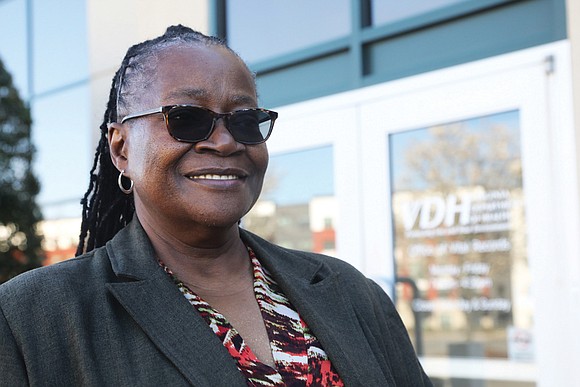Janet Rainey retires after 47 years of keeping records vital
Jeremy M. Lazarus | 3/9/2023, 6 p.m.

Keeping records of the births, deaths, marriages and divorces that occur in Virginia may seem like dull work.
Don’t tell that to Janet M. Rainey.
Retired as of Jan. 31, the 66-year-old spent her life in what she describes as an “intriguing field,” rising to lead the records office of the Virginia Department of Health for 18 years.
Ms. Rainey was the sixth state registrar since the office was established in 1912 and the second Black woman to hold the office’s top post.
Today, Ms. Rainey looks back at a 47-year career that emphasized accuracy and attention to detail.
She participated in the technological revolution that computerized the records collection and had a ringside seat on societal changes, ranging from racial integration to gay marriage.
VDH credits her with helping the Office of Vital Records evolve from a paper-based operation to a computer-driven information center that takes in and safely makes records accessible electronically at local health department offices and through the Department of Motor Vehicles offices.
“Her dedication to ensuring the integrity and security of the state’s vital records has benefited all Virginians. Hundreds of thousands of vital records requests are processed every year, and she and her team have worked tirelessly to make them more available,” said Dr. Colin M. Greene, outgoing state health commissioner.
“During her tenure, the state began recording marriages and divorces between people of the same sex, which “is something I thought I would never see in my lifetime,” Ms. Rainey said, and changed birth records for those who had sex-change operations.
She also ensured that adoptions by two parents of the same sex were properly recorded after the Virginia Supreme Court in 2005 overturned a ruling by her predecessor, Deborah Little-Bowser, the first Black woman registrar, to prevent both parents from being named.
Ms. Rainey also was part of the office’s team that has worked to undo the damage from the 1924 Virginia’s Racial Integrity Act. That law allowed the state’s first vital records registrar, avowed racist Walter Plecker, to virtually eliminate Native Americans by labeling them as “colored.”
For 17 years, she and other team members worked with Native American families to correct their birth certificates to ensure they and other family members were properly listed as tribal members.
Through her decades with the office, Ms. Rainey continued to personally help Virginians find and correct their records, VDH noted. Before Ms. Rainey retired, VDH cited her for assisting to properly list an 88-year-old whose birth was never recorded.
As registrar, Ms. Rainey carried out a legislative mandate to connect Virginia’s vital records with the genealogy firms such as Ancentry.com, making records more available to individuals researching their family tree, VDH stated.
She also is credited with working with DMV to link that agency to the computerized records, which has enabled DMV to issue than 1 million birth certificates and other records to customers since 2013.
She also played a key role in creating an electronic system that makes it easier for doctors, medical examiners and funeral homes to file death certificates and enabling mothers to obtain a copy of a newborn child’s birth certificate while in the hospital, VDH noted.
“It’s been an amazing ride,” Ms. Rainey said, whose only regret is that she was unable to complete making marriage and divorce information more available through court clerk’s offices and other sites before she left office.
It didn’t start out that way for the daughter of a farmer and a factory seamstress, who grew up in rural Chase City in Mecklenburg County.
Like several siblings before her, her parents encouraged her after she graduated from high school to go to Richmond to find a better life than was available in an area where agricultural or factory work were the main occupations.
With the support of two sisters who already had come to Richmond, Ms. Rainey said that she went to Smithdeal-Massey Business College to improve her office skills and landed a clerk typist job immediately after graduating in the VDH office that would be her workplace from then on.
Her initial tools were pencils, ink pens and hundreds of record books that had to be searched by hand.
“I wasn’t sure I liked it at first,” she said, but she began taking more of an interest with help from a mentor, Russell E. “Rusty” Booker Jr., then an assistant registrar and later state registrar for 13 years. She said Mr. Booker helped her understand the importance of the work. Ms. Rainey said she began developing a passion for vital records after she was promoted to the section that worked on correcting primarily birth records. She said she was shocked to find out about the alterations of the facts of a person’s birth that Mr. Plecker and his successor, Estelle Marks, directed and became immersed in working with people to make corrections.
She rose to become assistant state registrar and took on the top post in 2004, first on an interim basis. She became the permanent director in 2006.
Some people hoped she would stay until she had served 50 years, “but that wasn’t me,’ she said with a laugh.
Instead, she looks forward to fishing, traveling and visiting with members of her family.
Still, she believes she made the right to decision to make her career in the records office.
“People will chase the dollar more so than the career,” she said. “Sometimes our careers may not pay a top dollar that we want, but it’s something that you can go home saying that you made a difference in somebody’s life.”






